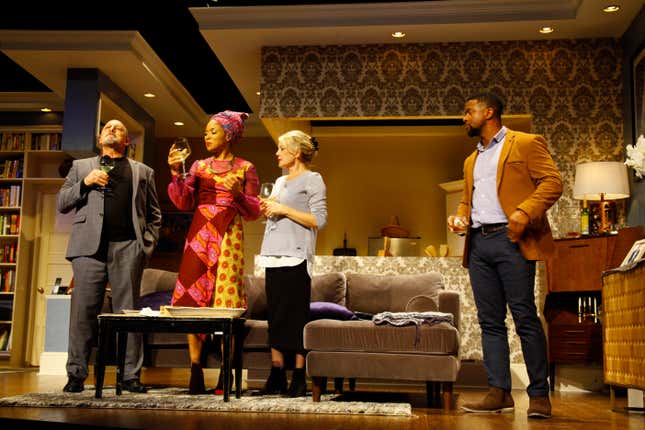
“Reparations” is defined by the Oxford English Dictionary as “the making of amends for a wrong one has done, by paying money to or otherwise helping those who have been wronged.” It is defined by black folk as any number of possibilities: free education, free health care, 40 acres and a mule.
It is fitting that a show titled Reparations be the center of Brooklyn’s Billie Holiday Theatre’s New Windows Festival, and that it is being launched during the 400th commemorative year of the beginning of slavery.
As pointed out by Dr. Indira Etwaroo in her editor and director’s note, the festival “goes beyond race to explore the intersectionality and complexity of identity and to spotlight voices and perspectives that have not historically been presented at The Billie.” New Windows only showcases “non-African diasporic perspectives” (i.e., white folks), a first in the theatre’s 47-year history. It is ironic, then, perhaps, that Reparations specifically grapples with a black person’s right and legitimacy in creating their own narrative(s).
Almost immediately, race, class, and gender dynamics are introduced to us on stage. A young black man accompanies an older white woman back to her Upper East Side apartment. They are excited. This is about sex. The first question I asked myself was, “What do they offer each other?”
Directed by Michele Shay, a black woman, but written by James Sheldon, who is white, Reparations forces its audience to think more broadly about how compensation might look—and how it might look when black people are afforded a platform to speak from. The triumphs and tragedies of existing while black in white-dominated worlds (i.e., those of us with “good education” and “decent healthcare”) are brought to the fore. The play also explores how it might look when violence done unto a black body is not only historical, not only systemic, but repackaged as an evil that anybody can relate to.
Reg, played by actor Kamal Bolden, seeks recompense for being violated by his high school teacher, a white man. As the play unfolds, we find that Reg is a quick and self-assured writer who needs a book deal but also needs to finally speak his personal truth, processes for which he means to make demands but ends up needing permission from the white folks to complete.
Eventually, two new characters are introduced, a British-Nigerian wife, Lisa, and her white British husband, Alistair, played by Lisa Arrindell and Gys de Villiers. They are over for lunch and we find out they, too, are survivors. This is one of several points of connection extended across race and othering, including grief.
Ginny, the host, acted by Alexandra Neil, who says to Reg in response to his sharing his violation, “we’re all suffering and we’re all in boxes,” plays somewhat of a liberal white savior who does evolve but ultimately remains grounded in selfishness. Once Ginny can accept her own deceit then she agrees to a resolution in a way that allows her to shed her own guilt, which only works to destabilize Reg’s position.
In the end, I was left wondering if the black folk gained more by what they created for themselves and concluded, as per usual, that they really end up giving a lot more to the white folk than the other way around.
The performances in Reparations were really well-executed, and I was left with a lot to chew on and parse through afterward. And although the play wasn’t particularly exciting to sit through, I found myself appropriately uncomfortable but also a bit uninspired as I wished for more reward or resolution for the black characters. Some of the dialogue, especially around race, at times felt redundant or safe even amidst a plot so provocative and groundbreaking.
And yet, it’s the simple questions that lead to my larger ones: How much are we the same? How much are we different? Can our traumas be the same? Can we empathize with one another’s pain completely knowing that race is always a factor? And finally, what does it mean to centralize black narratives?
In thinking about those questions, I’ll leave you with the closing sentence of the New Windows Festival catalog: “The African American Story is the very foundation of the American Story.”
The New Windows festival is running at the Billie Holiday Theatre at BedStuy’s Restoration Corporation where they will be producing Reparations until Nov. 24. Tickets are available here.

